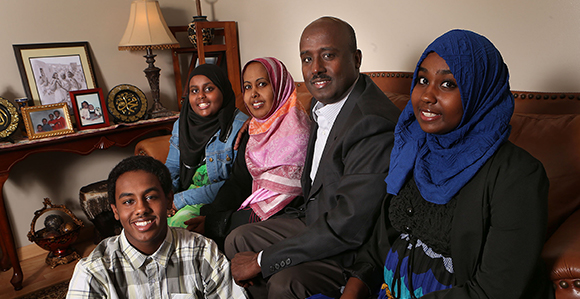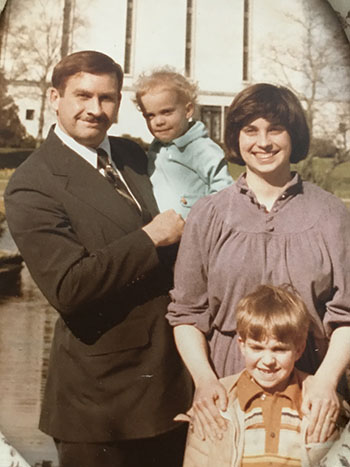Modern Pioneers Continue Legacy of Sacrificing for Beliefs
Contributed By Sarah Harris, Church News staff writer

Aden Batar, center right, said he considers himself a pioneer, as he and his family made Utah their home after leaving Somalia as refugees in 1994. Photo by Tom Smart, Deseret News.
“These are people who don’t have a homeland that will take them back or that is a safe place for them to go back to, and I think that’s where there’s a really strong similarity with the Mormon pioneers.” —Asha Parekh, director of Utah’s Refugee Services Office
President Thomas S. Monson said in his July 2016 First Presidency Message that to be a pioneer is to become acquainted with sacrifice.
“Although members of the Church are no longer asked to leave their homes to make the journey to Zion, they often must leave behind old habits, longtime customs, and cherished friends,” President Monson said (“True to the Faith of Our Forefathers”).
Refugees past and present
Many people today make sacrifices for their beliefs, and they carry on the pioneer legacy as modern pioneers.
In the same way early Mormon pioneers were forced to flee their homes based on their religious beliefs, there are currently more than 65 million people worldwide who have been forcibly displaced as a result of conflict or persecution. This number includes 22.5 million refugees, more than half of which are under age 18, according to the United Nations High Commissioner for Refugees office’s June 2017 statistics.
“These are people who don’t have a homeland that will take them back or that is a safe place for them to go back to, and I think that’s where there’s a really strong similarity with the Mormon pioneers,” said Asha Parekh, director of Utah’s Refugee Services Office.
Different faiths, similar experiences
Like the early Mormon pioneers, modern refugees face the prospect of harsh weather conditions, lack of provisions, disease, and death as they flee their home countries, according to Aden Batar, director of migration and refugee services for Catholic Community Services—one of the largest resettlement agencies in Utah.
Batar, who was resettled through Catholic Community Services from Somalia to Utah in 1994 as a Muslim refugee, said the experiences of modern refugees are also similar to those of the Mormon pioneers at the resettlement stage, as their arrival means having to start their lives all over again.
“Same thing with the Mormon pioneers—when they came to Utah, they found this new land; they had to start a new life and make this their home,” Batar said. “I consider myself as a pioneer coming to this new community in Utah. I consider this my home now. This is a state, a community that welcomed me and my family, took us in, and helped us to overcome all those challenges.”
Modern frontiers for the gospel

Matias Pedreira, right, was the first in his family to join the Church and was baptized by the missionaries as an 18-year-old in Uruguay. Photo courtesy of Matias Pedreira.

Marsha Thomas, right, and her husband, David, left, stand with their children in front of the London England Temple, where they were sealed as a family 11 months after joining the Church. Photo courtesy of Marsha Thomas.
Modern converts to the Church are also acquainted with some of the sacrifices of the early Mormon pioneers.
Dora Situmorang, an LDS Business College accounting student from Indonesia, is the pioneer member of the Church in her family. She was baptized at 15 when her sister’s friend introduced her to the Church, and she later served as a missionary in the Indonesia Jakarta Mission.
“Living as the only member in my family sometimes is not easy,” Situmorang said. “But I know that if I [am] like the pioneers and show my faith all the time and live my faith, it will let the people around me to be able to recognize the truth that comes from the gospel.”
Matias Pedreira, an LDSBC information technology student from Uruguay, was also the first in his family to join the Church. He said the biggest sacrifice he had to make when he was baptized at 18 years old was facing his family’s disapproval of his decision.
“They were very, very, very disappointed, and I think that the biggest thing was trying to not feel hurt of that and trying to not see that like rejection, but understand that they still loved me,” Pedreira said.
He worked to show his family the restored gospel was good and ended up baptizing his parents and four siblings about a year later.
“Even though everything maybe today looks dark and looks difficult and seems that whatever you do is not enough, if you just trust in God and keep putting one step in front of the other, things will work out in the end, and you can see the power and the mercy of God in your life,” Pedreira said.
Faith in times of difficulty
Marsha Thomas, a member of the West Bountiful 5th Ward, West Bountiful Utah Stake, said she has been able to relate to the pioneers through her personal challenges in life, such as her husband’s death to cancer nine years ago and now battling with cancer herself.
“I’ve known people that either blame Heavenly Father because it happened to them, or you can turn to Him and let Him support you, and that’s what I’ve chosen to do instead of being upset with Him,” Thomas said. “He knows His timing; I don’t.”
Frank Flores, an LDSBC cybersecurity student from Honduras, said he has been able to relate to the pioneers by having to travel long distances to attend church or the temple.
He said while he was growing up in Honduras, he and his family had to walk for two hours to get to church and take an eight-hour bus ride to attend the temple in Guatemala. Then when he moved to Utah, he became a temple worker in the Provo Utah Temple and had to walk for one hour to get there from his house since he didn’t have a car.
“It was a sacrifice, but I’ve honestly been blessed so much for that experience,” Flores said. “I think the pioneers, when it comes to distance, they probably did a lot more than I did, and they just had to endure a lot of things without complaining.”
Service from sacrifice
Flores was also able to relate to the pioneers while serving a mission in Washington, D.C., from 2013 to 2015. He said he learned from his experiences on his mission to humbly follow the promptings of the Spirit.
“I’ve been blessed by that experience,” Flores said. “It has helped me work on my discipleship and understand that when God has plans for us that He will make them happen.”
There are now more than 70,000 missionaries currently serving in 422 missions throughout the world, according to the Church's most recent statistical report. Similar to the pioneers, these missionaries sacrifice to further the work of the Lord by leaving their homes and traveling to foreign places, often having to face rejection and adapt to a new culture and language along the way.
To be a Latter-day Saint is to be a pioneer, as pioneers by definition go before to prepare the way for others to follow, according to President Monson’s First Presidency Message.
“The path of a pioneer is not easy, but we follow in the footsteps of the ultimate Pioneer—even the Savior—who went before, showing us the way to follow,” President Monson said.

Dora Situmorang, an LDS Business College accounting student from Indonesia, is a pioneer Church member in her family. Photo by David Anyanwu.

Matias Pedreira, left, baptized his family about a year after his own baptism and was sealed to them in the Montevideo Uruguay Temple before he left on a mission to Rome, Italy. Photo courtesy of Matias Pedreira.
